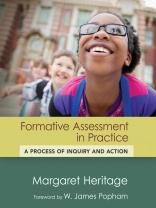Margaret Heritage presents a practical guide to formative assessment as a process of “inquiry and action” essential to twenty-first century learning.
In the wake of the development of the Common Core standards and the effort to develop the appropriate assessments to accompany them, formative assessment has attracted increasing attention from policy makers and practitioners alike. Yet this powerful and promising approach is often applied in ways that fail to capture its potential for improving student learning. In her book, Margaret Heritage presents a practical guide to formative assessment as a process of “inquiry and action” essential to twenty-first century learning.
Heritage’s approach is distinctive in that it is grounded in a “children’s rights” framework—that is, the belief that assessment should be in the best interest of all students, that students should be involved in the decisions that ensue from assessment use, and that opportunities to learn, progress, and succeed will be available to all children equally. Accordingly, she addresses the students’ own role in learning about themselves as learners and examines the classroom as a community of practice. The book also includes chapters on learning progressions and the policy contexts that support formative assessment.
Skillfully interweaving theory and practice, this book promises to be an invaluable resource for teachers, teacher educators, and those interested in the academic and policy aspects of assessment.
Circa l’autore
Margaret Heritage is the assistant director for professional development at the National Center for Research on Evaluation, Standards, and Student Testing (CRESST) at the University of California, Los Angeles. Her current work focuses on formative assessment, including teachers’ use of formative assessment evidence, and on the development and assessment of academic language for English language learners. She has published extensively and made numerous presentations on these topics all over the United States, and in Europe, Australia, and Asia.
Prior to joining CRESST, she taught in and held leadership positions at schools in the United Kingdom, including a period as a county inspector of education, and in the United States, where she was principal of the laboratory school of the Graduate School of Education and Information Studies at UCLA. At the higher education level, she has taught graduate classes at the department of education at the University of Warwick, United Kingdom, the University of California, Los Angeles, and at Stanford University.












